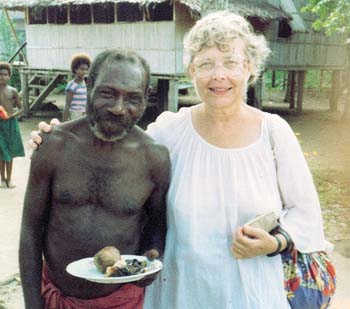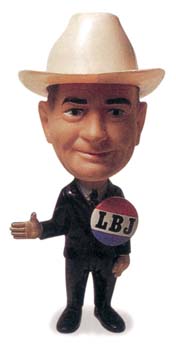
village in 1990. Billings’ extensive research into the
Johnson cult has led her to argue that, in its primary
focus, it is an improvised act of political theater — in
other words, a satiric joke.
Was LBJ really on the ballot — or was this just a crazy cult of personality?
In 1964, fully half the Lavongai people of the island of New Hanover voted for then-U.S. President Lyndon B. Johnson to represent them in their House of Assembly.
But why in the world would people living on a remote South Pacific island north of New Guinea try to elect LBJ? Dorothy Billings, WSU associate professor of anthropology, has spent years searching out answers.
Her field work, analysis and interpretations of this fascinating event are explored in the book, Cargo Cult as Theater: Political Performance in the Pacific, published in 2002.
Billings notes that it’s hard to get around the humor of the story. “There was a time,” she says, “when I began to feel guilty that whenever I told the story, I made people laugh. I thought, ‘I’ve got to tell the story straight. I can’t let these people become a joke in my classes.’ So, I tried it once. Not only did people not laugh, the story disappeared.”
Billings became professionally interested in how the vote for Johnson came about while working as a senior tutor in the University of Sydney’s anthropology department. Determined to study firsthand what came to be called the “Johnson cult,” she had to work through difficult arrangements with territorial authorities before beginning field research in New Hanover in 1967.
“I was told it was too dangerous,” she recalls. Yet after subsequent research trips in the 1970s, 1980s and 1990s, she notes that she’s become lifelong friends with many of the people she’s interviewed. And, although puzzles remain, she’s also mapped out some intriguing observations about group behavior, political theater and cultural style.
Understanding the motivations behind the Johnson cult begins with understanding a wider cultural phenomenon — cargo cults. Cargo cults, Billings explains, began in Melanesia more than 100 years ago. From the 1910s to the 1930s many Melanesians (including those in New Hanover) served as cargo carriers for visiting whites.
“Cargo” became the pidgin English word for “white man’s goods,” and cults arose when Melanesians realized that whites had a great deal of cargo, while they had little or none.
From there, Billings says, several mythologies developed. Some feature a belief that cargo was delivered to the island by ancestors with the names of their descendants written on it, but the whites, while colonizing the island, discovered the cargo first and wrote their names on it instead.
Their taking of the cargo — so goes the myth — is the reason they are so profitable. In other instances, Billings notes, the arrival of cargo is tied to the faith of the natives. In anticipation of a cargo drop, the people of the islands destroy their gardens, all their goods and assert that if their faith is strong, the cargo will arrive. If it does not, there must be a weak link in the communal chain.
In 1964, the people of New Hanover were gaining their independence from Australia. “Some of the islanders had never seen white people before,” Billings relates, “but the whites went around with their little red ballot boxes, showing the islanders how to fill out ballots. Afterward, there was an article in the Sydney Morning Herald announcing that the elections had gone well.” Billings pauses, smiles and adds, “Except for one place — New Hanover. They really screwed up. They voted for Johnson.”

Johnson was, at the time, mounting a re-election campaign, but the distance between New Guinea and America was, especially then, vast. During WWII’s Battle of the Coral Sea, more than a million Americans had been in the region. The New Hanoverians saw American servicemen then, but why vote for an American politician two decades later?
Political and social analysts at the time decided it was a typical cargo-cult maneuver, that if the people of New Hanover elected LBJ, Americans would come to the island.
“The Americans,” Billings explains, “gave the people cigarettes. They were nice to them; they ate together. That may have caused the people of New Hanover to reason, ‘You know what? Now that we have the chance, let’s vote for the Americans. We’ve always wanted them to come back.’”
What never occurred to anyone, including Billings, until later, is that it was a joke. “They are jokers — straight-faced jokers,” Billings says.
“But I was a very serious social scientist and it never occurred to me that they could be joking.” The joke may have been a thumbing of the nose to the Australians, who had colonized the country for 52 years but in that time did very little to develop the region.
“What happened,” Billings says, “was that a patrol officer had shown up with his red plastic ballot box and said, ‘Okay, come and vote. You’re going to choose the names of the men that you want to serve in the House of Assembly.’ But the people said, ‘Oh, we’ve already voted.’
They pointed to a blackboard that they’d stolen from the local mission. There, on the blackboard, they’d written, ‘We want Johnson of America. Just him. That’s all.’ Whenever they told me that story, they laughed. But it took me 15 years to figure out they were part of an impromptu political satire.”
The 1964 New Hanover election story made the pages of Newsweek and Time, although Billings didn’t see the reports until later. As always, interpretations of the basic information varied widely. Some people found humor in the situation, while others found anything but. One priest, Billings notes, wrote Time to announce that the cargo cults were dangerous and organized by communists. “In a way they are,” she says, “because they’re for the people and against elitism.”
Johnson cultists hoped for the president’s arrival in New Hanover, though he never did make the trip. In 1965, as Johnson was promising to de-escalate the Vietnam war, Billings received a letter from a man in New York. It said, “Tell them we can’t spare Johnson right now, but we thank them for the invitation.” A year later, as U.S. involvement in the war grew, a second letter arrived: “Tell them we’ll be glad to send Johnson!”
Did Billings ever hear from Johnson himself? Yes, she did. In 1969, she sent him a copy of an article she’d published about the Johnson cult as well as a letter detailing her work. Johnson responded, writing, “It’s nice to know that people so far away appreciate the American way of life.”
Billings points out that wasn’t exactly the point: “People pick out of things what they want. It is true that the people of New Hanover appreciated the American way of life — in a way. They were angry with the Australians because of the way they’d ruled, but they liked the fact that the Americans sat down to eat with them, that the Americans who had visited the island gave them food. But it wasn’t the food, it was the way it was shared. One of them said, ‘We want to find a way to have good, happy and useful lives.’ I think there was something in the Americans that gave them hope. Johnson was not central to their way of thinking, Americans were.”
After years of research, Billings has come to believe that the cultists never did want only cargo. They were interested in social and cultural change. In her book, Billings quotes one islander as saying of the Americans: “Their ways are not the ways of all men. Their ways are very good.” And another told her, “It was not the food that (we) liked, just the way.”





